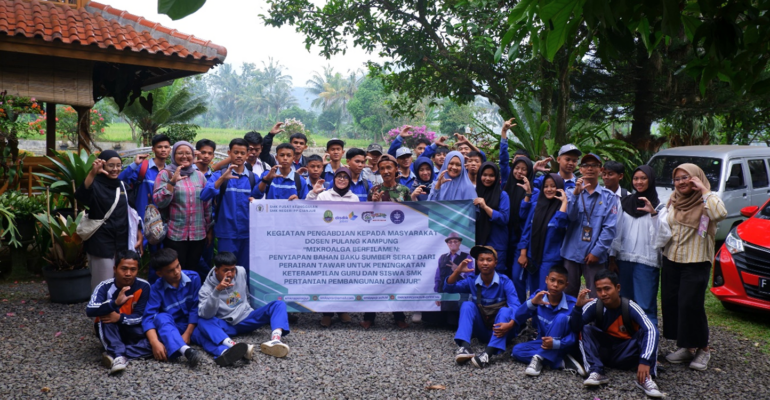Prof Niken TM Pratiwi and the Team Introduce Microalgae to SMKN PP Cianjur Students Through Lecturers Returning Home

In an effort to introduce microalgae as one of the raw materials for fibre sources from fresh waters to the community, IPB University lecturer, Prof Niken TM Pratiwi, together with a team from the Department of Aquatic Resource Management (MSP), Faculty of Fisheries and Marine Science (FPIK), carried out the Dosen Pulang Kampung (Dospulkam) program in Gasol Village, Cianjur, West Java. This activity involves students and teachers from the Fisheries Agribusiness Expertise Program of SMKN PP Cianjur.
The event began with interviews with local lukut farmers, who have successfully developed filamentous microalgae into economically valuable products. This dialogue provides direct insight into the way of farming and utilisation of algae, which are known to have various benefits such as food, feed, energy sources, and antibacterial.
“We, the IPB University lecturer team, really appreciate the efforts of local farmers in processing lukut into an important commodity for the Cianjur economy,” said Prof Niken.
After the interview session, Prof Niken and the team gave an in-depth introduction to filamentous algae to students of SMKN PP Cianjur. The students were invited to directly observe two types of algae that are commonly found in the lukut farming area.
“Under the guidance of the Dospulkam team, students observed the different morphologies of algae types using microscopes in the school laboratory. In addition, they are also given training on the ways to maintain and cultivate filamentous algae on a laboratory scale,” she explained.
According to her, this Dospulkam program not only aims to expand the horizons of students and teachers about the potential of algae as a leading commodity in the future, but also to improve skills and build closer synergies between academics and the community.
“Through this education, it is hoped that the use of aquatic resources as a fibre source that can develop more rapidly in Cianjur, with active contributions from the educated young generation,” she concluded. (*/Rz) (IAAS/IAN)



